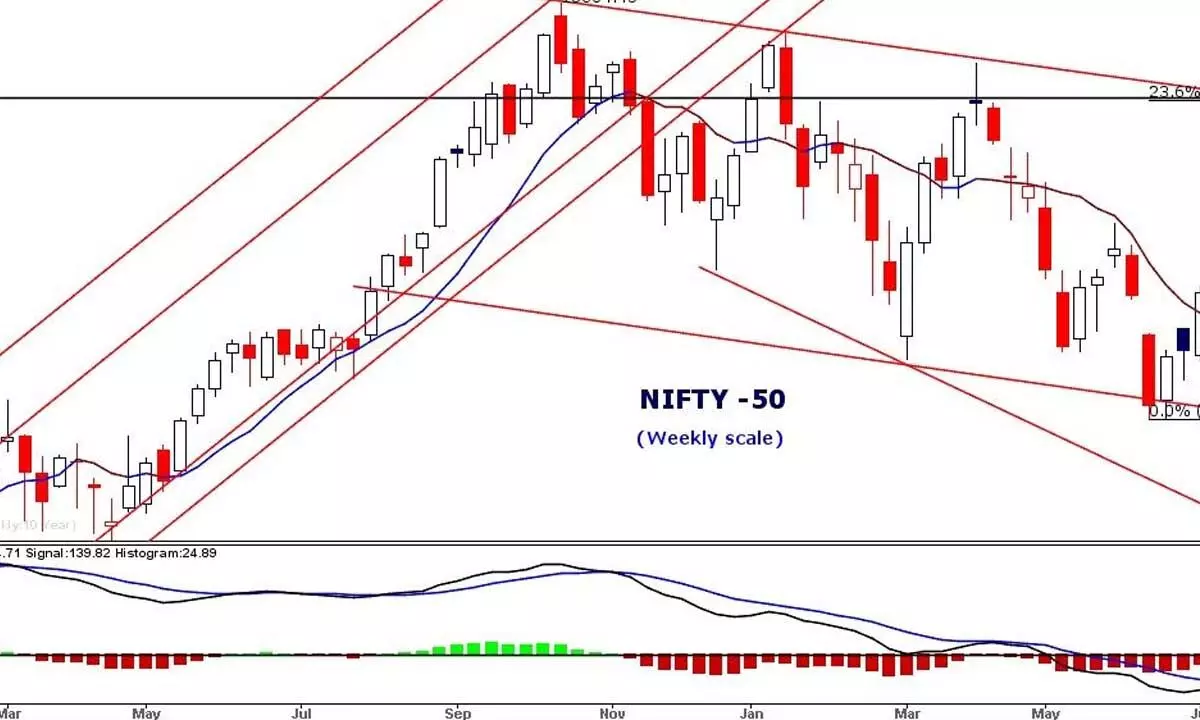Consolidation may continue further
The negative directional indicator, -DMI, is currently dominating; ADX is almost flat; The MACD line is below the zero line
image for illustrative purpose

With increased volatility, equities worldwide witnessed sew-saw moments that triggered stop losses on either side. The domestic benchmark index NSE Nifty traded in a 398 points range and settled with 128.95 points or 0.75 per cent. BSE Sensex is down by 0.5 per cent. The Nifty Midcap-100 and Smallcap-100 indices declined by 2.8 per cent and 1.7 per cent, respectively. On the sectoral front, the Nifty IT was up by 0.8 per cent, and the Bank Nifty advanced by 0.3 per cent. On the flipside, Realty declined by 4.2 per cent, and Metal was down by 2.8 per cent. The FIIs intensified the selling pressure. They sold aggressively last week, and all the inflows dried up. As of date, FIIs sold Rs9,978.26 crore, and the DIIs bought Rs8,055.05 crore worth of equities. The broader market breadth is not encouraging.
The global tremors are becoming more and more violent. One day up, another down with big swings, Gap opening, and intraday recoveries have become habitual for the equity markets. After the US CPI data announcement, the Dow index opened sharply lower and recovered 1400 points from the opening lows on Thursday. This has influenced the Indian market to recover the losses at the weekend on Friday. As the benchmark index recovered over a percentage point, the Nifty has formed an inside bar. Otherwise, it would have been a negative candle. Interestingly, the index opened above the 20 and 50DMAs, but failed to sustain above them. On Friday, it opened with an over 300 points positive gap before closing a one per cent net gain, and it declined over one per cent from the day's high. This kind of volatility has triggered the stop losses on both sides.
On the other side, the gap openings hit hard for positional traders. Technically there is no change in the direction. The market is still in consolidation. It is still below the prior parallel lows of 23rd August and September. The consolidation is going on between the long-term 200DMA and the short-term averages of 20 and 50DMAs. The inside bar and the narrowing Bollinger bands suggest that the consolidation may continue for some more time. The 6th October high, 17429, is a minor high, which is also a resistance point. Above this, the 50DMA of 17492 is the next level of resistance. A decisive close above this zone is crucial for turning on a bullish bias.
At the same time, there are no positive divergences established yet in any leading indicators. The Anchored WVAP acted as a support for the week. The Relative Strength Index is still below 50 and in a neutral zone.
The MACD line is below the zero line, and the histogram is yet to give a green tick. The negative directional indicator, -DMI, is currently dominating, and the ADX is almost flat. For now, the 200DMA of 16987 and the 200EMA of 16908 is crucial support zone. After one day of trading below the 200DMA last week, it bounced. In any case, a close below 16908 and or a recent swing low of 16747 will be very crucial for the medium term. Interestingly, the rising trendline support is near the 200DMA. So, a break below the 16980 will give an early signal for downside probabilities.
The Dollar was broken out of a small tight range and tested a near Rs.83 level. Our targets are still open to above Rs84 zone. Importantly, the foreign exchange reserves also declined to $532.88 billion from the all-time high level of $645 billion in October 2021. The decline in the Rupee value and the fall in equities are systematic moves. Alongside the Dollar-Rupee equation, the FPI flows once again outflowing aggressively. Last, they sold more than Rs9,900 crore. If the Dollar rises further, we may see further FPI outflows.
For now, the equity markets are trickily placed for the near future. Trading indices will be a challenging task. As the earning season has already begun, it is better to focus on a growth stock which declared more than 20 per cent acceleration in earnings. Stock-specific activity will continue. Avoid highly leveraged position trading.
(The author is Chief Mentor, Indus School of Technical Analysis, Financial Journalist, Technical Analyst, Trainer and Family Fund Manager)

